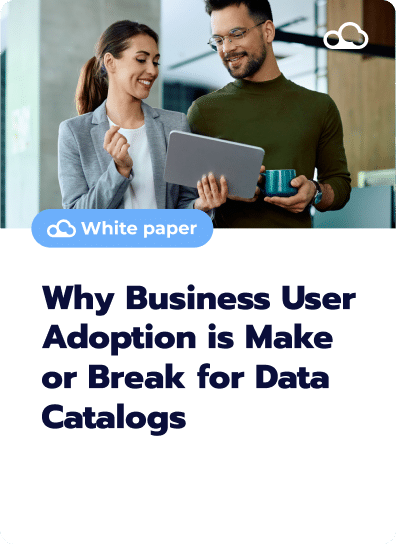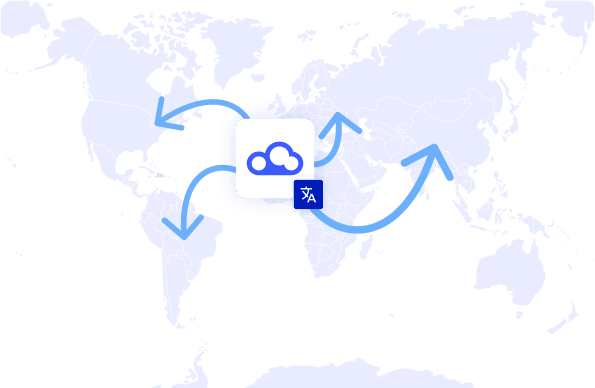With advancements in data-related technologies like AI, organizations with global operations are consuming and producing more data than ever before. Industry reports from analysts like Gartner, Forrester, IDC, and BARC highlight a gap in data and AI governance technologies that address the unique challenges posed by language and cultural barriers.
Many organizations with global operations report that their data growth will maintain an upward trajectory as they build more systems to effectively collect, store, and manage data to drive business decisions.
This blog post will discuss the importance of a shared language and culture in a modern data-driven organization and discuss how leading-class solutions like DataGalaxy can help solve the multilingual divide.
The role of AI in bridging language gaps
While AI advancements and natural language search are available across a myriad of data and AI governance tools, there is an opportunity to consider tools that enable multilingual collaboration among data teams. These teams face the daunting task of translating and interpreting data effectively across languages. Integrating data-related technologies like AI is foundational for achieving successful data and AI governance outcomes.
Data that speaks your language
Multilingual AI: Breaking language barriers for effortless data collaboration
DataGalaxy’s commitment to making data knowledge accessible drives our innovation. By integrating advanced translation and multilingual search capabilities into our Data Knowledge Catalog, we’re breaking down barriers in data understanding and use, fostering a truly global, data-driven culture.
AI tools in a data governance platform play a crucial role in helping multilingual teams communicate effectively and drive data-driven insights. These tools eliminate language barriers and ensure seamless collaboration by leveraging real-time translation, AI-powered natural language processing, and intelligent data interpretation.
They can automatically translate metadata, data dictionaries, and governance policies, making critical information accessible to all team members, regardless of their native language.
Most data and AI governance governance programs are confined to regional success where dominant languages persist, however a 2020 study by McKinsey Global Institute shows how data siloes, often perpetuated by cultural and linguistic divides, reduce the effectiveness of data and AI governance.
Organizations that address these divides through language considerations achieve better integration in global operations and monetization of data assets.
Multilingual AI capabilities enable users to query and analyze data in their preferred language, promoting inclusivity and improving decision-making. By standardizing data definitions and facilitating smooth cross-language communication, AI-driven data governance platforms empower multilingual teams to extract accurate, consistent insights, ultimately enhancing efficiency and global business operations.
Key takeaways for using data & AI governance to meet business goals
Global teams must consider the role of language in cross-collaboration
Address language barriers to interpret data more effectively
Deploy AI systems for critical data assets, particularly multilingual data
Address language and cultural barriers to break down data silos and enhance collaboration
Recognize that language diversity is key to knowledge sharing in global operations
The ROI in global operations depends on the ability to address language and cultural challenges to realize economic value
DataGalaxy's multilingual AI data governance platform
DataGalaxy’s AI-driven multilingual data catalog isn't just a translation tool - It's a unified platform connecting people, AI systems, and data models. Harmonizing metadata and eliminating language barriers transforms how teams collaborate and how machines process information, making data a universal resource.
The semantic layer: The backbone of a multilingual catalog
At the core of DataGalaxy’s innovation lies its semantic layer, a technology that ensures metadata is not just translated but harmonized. The semantic layer enables:
- Consistency across languages: Metadata created in one language is aligned with others, preserving its meaning globally
- Smarter AI systems: Structured, harmonized metadata enhances AI accuracy, reducing errors in insights and analysis
- Seamless integration: It ensures compatibility with tools like analytics platforms and machine learning models, enabling smooth workflows
This harmonization bridges the gap between human collaboration and machine intelligence, ensuring clarity and efficiency across global teams.
Multilingual search: Finding data without limits
DataGalaxy’s multilingual search goes beyond simple translation to provide intuitive, accurate discovery across languages.
- Cross-language functionality: For example, a search in English can retrieve metadata in French or German
- Contextual precision: AI-powered search understands the intent behind queries, delivering relevant results instead of basic keyword matches
- Unified experience: Whether for a team member or an AI system, search results are consistent and actionable
This capability eliminates delays caused by language barriers, enabling faster access to the right data.
Accelerating user adoption
Introducing new tools can often be met with resistance, but DataGalaxy’s multilingual data catalog is designed with adoption in mind. Its intuitive interface and immediate value proposition make it easy for teams to embrace.
Why our users love DataGalaxy:
- Ease of use: The catalog is designed to be as straightforward as a search engine, allowing users of all skill levels to navigate it effortlessly
- Immediate impact: Multilingual functionality ensures users can access data in their preferred language from the start, reducing frustrations and increasing productivity
- Cross-departmental appeal: Whether it’s sales, IT, or operations, teams across the organization benefit from its capabilities, fostering widespread adoption
This focus on simplicity and relevance ensures that the catalog becomes indispensable to daily workflows.
DataGalaxy’s multilingual data catalog redefines how organizations manage metadata, enabling global teams and AI systems to work seamlessly together.
Breaking down language barriers and harmonizing metadata transforms the catalog into a cornerstone of collaboration and growth. Welcome to the future of data management. Welcome to DataGalaxy.
Fueling smarter decisions for
200+ industry powerhouses.










